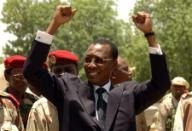Chad’s Deby expected to be re-elected
May 1, 2006 (N’DJAMENA) — President Idriss Deby is expected to win re-election in polls this week. But it may not seem like much of a victory.
 Many of the fellow tribesman who once supported him have taken up arms with the aim of toppling him, and most opposition political parties are boycotting Wednesday’s election, claiming that it is already rigged.
Many of the fellow tribesman who once supported him have taken up arms with the aim of toppling him, and most opposition political parties are boycotting Wednesday’s election, claiming that it is already rigged.
Deby also lost some support among donors after he took on the World Bank in a four-month dispute over how Chad’s oil revenues are used. The confrontation appears closer to a resolution after the two sides reached an interim deal last week under which the World Bank will gradually release US$125 million (A100 million) in oil revenues it froze after Chad changed key provisions of its World Bank-backed oil program.
In return for the funds’ release, Chad must pass a new budget law by July that ensures it does not use oil money for defense and begins to reform the way public money is managed, which includes fighting graft.
Deby, who seized power by force in 1990, won votes in 1996 and 2001 that critics say were neither vote was free and fair. Last year, he pushed for a national referendum to change the constitution to allow him to run for a third term. The amendment passed after an opposition boycott.
The election campaign has been largely lackluster. In addition to Deby, the field includes three of his allies and a minor opposition leader. About 5.8 million people in this country of almost 10 million are registered to cast ballots at about 11,800 polling stations.
It is only in the past week that the campaign picked up, with Deby flying to key towns in southern and eastern Chad over two days. More banners, billboards and posters appeared in the capital, N’djamena.
During the official campaign period that ended Sunday, the state-owned broadcaster has regularly aired each candidate’s spots explaining their political agenda.
Wrapping up his campaign Sunday, Deby defended his 16-year tenure, saying Chad had made economic and social strides and he had allowed democracy to take root in the country.
He told a largely young crowd of thousands at the N’djamena’s football stadium that Chad had seen its resources increase since becoming an oil producing country in 2003.
“I promise you our country will become a champion,” said Deby, who shed his customary suits for a jeans jacket and trouser with a white campaign T-shirt and baseball cap.
There was heavy security at the venue, with scores of members of the presidential guard, some with rocket launchers. There was an equally large contingent of riot police and regular soldiers.
Deby also railed against Sudan, something he has done since rebels who have been fighting in eastern Chad attacked N’djamena, about 1,000 kilometers (621 miles) from their bases on April 13 in a failed bid to oust him. Deby, who himself came to power with Sudan’s help, says the rebels are mercenaries hired by Sudan to destabilize the central Africa region, a charge Sudan denies.
Deby repeatedly points the finger at Sudan, but some of the leading insurgents are not only Chadian, they are family.
In February, two relatives who are military generals joined the rebels. Late last year, two of the president’s nephews who were responsible for the country’s oil program formed their own rebel group.
Sudan counters Deby’s accusations with charges Chad harbors Sudanese rebels that have fought a three-year conflict in Sudan’s Darfur region, which borders Chad.
Many of the Darfur rebels and Chadian rebels are from the same tribe, the Zaghawa, who found themselves on different sides of the border when colonialists drew barriers in the late 1800s and early 1900s. Deby also is Zaghawa.
Some of Deby’s domestic problems stem from a sense among some in Chad he has done too little to help Sudan’s Zaghawa. The Darfur fighting has seen tens of thousands of people killed, over 2 million made homeless in Sudan and another 200,000 fleeing to Chad.
Deby also faces a number of other small-scale rebellions in other parts of the country.
In recent months, the 19-party opposition alliance, called Coordination of Political Parties for the Defense of the Constitution, has repeatedly demanded the vote be postponed because it believes the poll is already rigged.
Thursday, Roman Catholic bishops asked rebels to call a cease-fire in exchange for the government delaying the vote. The rebels themselves have never said that they wanted the election postponed. They have only said they want Deby out.
Deby says delaying the poll will create a constitutional vacuum.
